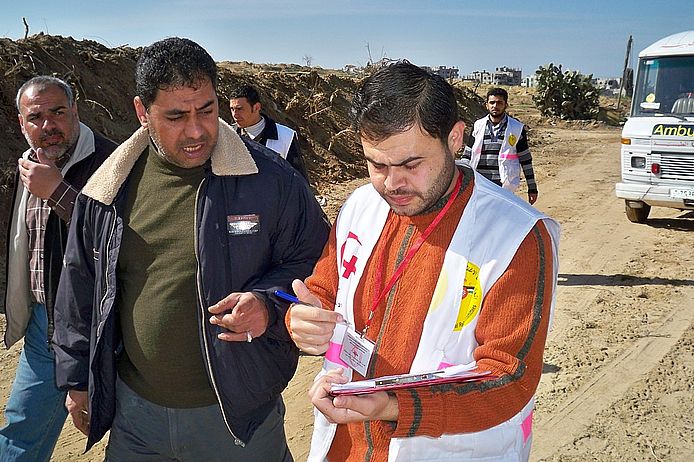Health work in the Palestinian enclaves
All people have a right to equal access to the highest achievable level of health. This absolute, indivisible right has been Medico International’s watchword since 1968. However health involves more than mere access to medicine and doctors; decent living conditions also play a role, i.e. the assertion of economic, social and cultural human rights. This is why health is always a political matter. In Israel & Palestine, national and ethnic backgrounds decide who gets access to healthcare. An enclave system has been constructed in the occupied territories, greatly curtailing the free movement of people and goods. Development potential has not simply been frozen as a consequence; every single area of life has been affected. Access to health services is highly restricted and political conditions systematically undermine any attempt to achieve humane living conditions. And that is without reference to the war impinging on everyday Israeli and Palestinian life, a fact we only mention in passing here.
Managing despite the odds
The wall and other barriers have had a particularly adverse impact on the rural population living near the Green Line and the recently built 443 motorway in the West Bank district of Ramallah. The motorway is for Israeli use only and bisects the whole region. During 2008 Medico continued working here with its partners in order to maintain and improve primary healthcare for 27 marginalised communities comprising 75,000 inhabitants. Patients were cared for by family doctors, gynaecologists and health workers. Clinics were renovated, patients received medicines at affordable prices and a number of laboratory technicians were at least able to carry out the most important basic tests in rudimentary laboratories. In addition to their daily work, healthcare professionals ran courses to help local people improve their knowledge of topics such as hygiene, chronic illness and nutrition. The situation in the Gaza strip was even worse. Israel continued to duck its responsibilities for a territory still under its control. The Gaza strip blockade, a consequence of Israel’s “Disengagement” policy, was further tightened following Hamas’ ascent to power in June 2007. As a result, an already inadequate civilian infrastructure imploded, including the water supply and the health sector. So that the marginalised communities’ poorest civilians could receive primary healthcare services, Medico supported its longstanding partner, the Palestinian Medical Relief Society (PMRS) and its endeavours to get primary healthcare to around 225,000 Gaza inhabitants. Medicines were purchased and transported to Gaza, despite delaying tactics from the Israeli administration. Patients suffering from acute or chronic illness obtained medicine and young children received formula milk. In addition, two mobile clinics attended to around 18,000 patients in marginalized localities, who were partially badly affected by military operations. There was also an item of unplanned expenditure - the cost of hiring a mobile clinic, because the corresponding PMRS equipment was destroyed during an Israeli air raid on Gaza’s city centre.
Meanwhile, over in the Jordan Valley, the Israeli administration is refusing to allow Palestinian households a water and electricity supply. Access to water and land is greatly restricted in favour of Israeli settlers, which forces the local Palestinian inhabitants to move into the overcrowded enclaves further west. Seeking to support these farming communities, the Union of Agricultural Work Committees (UAWC) and Medico have set up a pilot project helping two rural communities in the Jordan Valley to survive financially, to inform themselves of their rights and not to be forced out of their villages in order to live decently.
Theatre against despair
Many inhabitants are under great mental pressure due to diminishing social cohesion, coupled with economic decline and a dearth of future prospects (caused by the Israeli enclave system). Domestic violence, depression, a willingness to accept reactionary types of explanations and solutions are an outcome of this process. In private, people increasingly express a feeling of hopelessness, which undermines capacity to maintain or take forward a solidarity-based society concerned for the health of all. Hence Medico’s support for Jenin’s Freedom Theatre - drama can double as therapy. In the Jenin refugee camp, notorious for being a stronghold of violence, girls and boys have a safe space to work through their experiences of violence and powerlessness. Self-esteem gained enables them to be supportive to others and to question traditional hierarchies. The crisis in the occupied territories will only end if political conditions fundamentally change. For that reason, Medico funded its Israeli partner, Physicians for Human Rights (PHR-IL), so that it could compile reports showing unequal access to health, human rights violations, worsening exclusion and greater alienation between the different communities. Cooperation between Israelis, Jews and Palestinians on the basis of a common political agenda is illustrated in exemplary fashion by Jenin’s Freedom Theatre or by PHR-IL‘s and PMRS’s joint projects. Projects like these show that, whatever happens, we must never give up hope, even when hope seems a contradiction in terms.
We donated € 933,387 to our partners in Palestine and Israel in 2008. This sum includes grants from ECHO, the Ministry for Foreign Affairs and the Archiepiscopal Bishopric in Munich.

